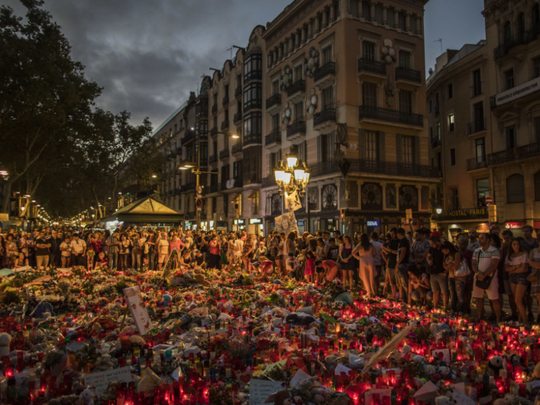
They did as much damage as they could do with knives and rented vans. They killed at least 15 people. They injured dozens of others — many of them tourists who were visiting one of the liveliest and crowded streets in Barcelona, one of the most beautiful cities in Europe. But they failed to do anything more than that.
The Catalan police were effective and impressive, killing or arresting 11 of the terrorist cell members within hours. The terrorists, some only teenagers, were bungling and chaotic; their earlier attempts at making a bomb ended in catastrophe, after an explosion killed two of them. Their “suicide belts” proved to be fake. And in the wake of the van attack, Spaniards were not cowed. On the contrary, the mood in Barcelona was defiant, not fearful; angry, not hysterical. After a moment of silence last Friday, crowds in the city spontaneously began to chant, “I am not afraid ... We are not afraid.”
This chant mirrors the sentiments in London a few months ago, after a similarly amateurish group tried to execute a similarly low-tech attack in Borough Market, another lively and crowded place. In London, as in Barcelona, well-prepared police reacted quickly, limiting the damage. In the wake of that attack, the London Mayor, Sadiq Khan, sounded exactly the same notes as the Spanish crowd. Addressing himself to the “sick and vile extremists who did these hideous crimes”, he declared: “We. Will. Defeat you. You. Will. NOT Win.”
It’s hard to define and difficult to pin down. But the atmosphere in Europe, and particularly in Europe’s most heterogenous, most “cosmopolitan” cities, has changed in recent months. More people understand that the goal of terrorism is not just death, but also chaos. More people realise that these attacks are often amateurish; if they had mass weapons, they wouldn’t be using cars. More people fear not terrorism, but the possible political aftermath of terrorism, the anger and hysteria that can be manipulated by populist politicians seeking support, or by tabloid media seeking sales. And more people understand that, by historical standards, the level of terrorism in Europe is still relatively low. In recent weeks, I’ve seen published, over and over again, charts showing that even when the notorious attacks in Paris and Brussels are included, the overall numbers are down from the 1970s, when a range of far-left movements and violent separatists, including ETA [Euskadi Ta Askatasuna] and the Irish Republican Army, were active.
Increasingly, this mood is at odds with the reaction of more distant outsiders to the same events. United States President Donald Trump’s reaction to London — he attacked Khan, via Twitter, for trying to play down people’s fears by declaring there was “no reason to be alarmed” by an increased police presence on the streets — was tasteless. But it had a trickle-down effect. An American friend told me that her daughter, on a study programme in Oxford this summer, wasn’t allowed to go to London: The trip was curtailed because other Americans were afraid of terrorism. To anyone who actually lives in London, that kind of fear — pumped up by Trump and inflated by Fox News — seems not just cowardly, but also ridiculous, as if Europeans would refuse to visit New York because they had seen white supremacists marching on TV.
Here is what I’m hearing instead: We should resist fear, and we should resist politicians who traffic in fear. We should support our police and our borders, but that doesn’t mean we support those who scaremonger about either one.
And don’t let terrorism change our society or our politics, because that means the terrorists win. It’s a powerful narrative, and it might well spread.
— Washington Post
Anne Applebaum is the director of the Global Transitions Programme at the Legatum Institute in London








